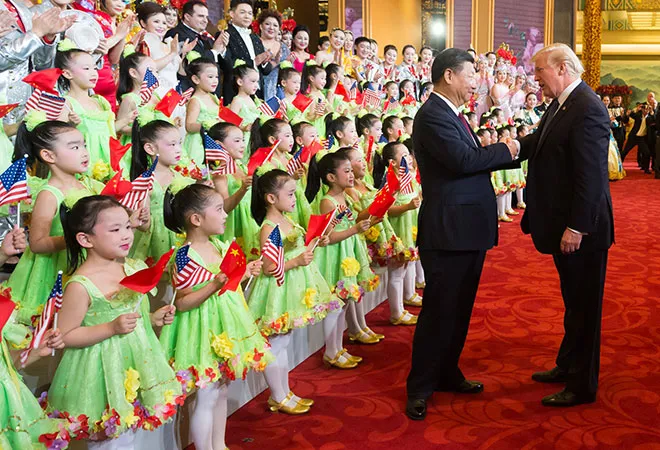-
CENTRES
Progammes & Centres
Location

In a remarkably forthright speech on China last month, US Secretary of State Mike Pompeo called on the Chinese people as well as the “free nations of the world” to change the behaviour of the Chinese Communist Party, arguing candidly that “if the free world doesn’t change Communist China —
Relations between Beijing and Washington have reached a historic low as a new consensus emerges in the US about its China policy. The Trump Administration has turned the screws on China over the past few months by taking a range of actions on various fronts – from human rights to trade and technology, from diplomatic and official disengagement to academic and scholarly exchanges. Last week, the US ordered the closure of the Chinese consulate in Houston, prompting China to take over the premises of the US consulate in the southwestern city of Chengdu in retaliation.
The US has also decided to challenge Chinese claims more robustly on the South China Sea issue with Pompeo arguing that most of China's claims in the South China Sea are “completely unlawful” calling out Beijing over its campaign of bullying in the area. Where previous US administrations were reluctant to come out in the open on this, the Trump Administration has drawn a line for Beijing. It has also taken measures to end Hong Kong's preferential trading status with the US after China’s imposition of its national security law that changes the very nature of Hong Long’s relationship with mainland China by challenging the Hong Kongers’ right to freedom of expression. Sanctions have also been imposed by Washington on a number of Chinese officials, including a senior member of the Communist Party, over China’s targeting of its Muslim Uighur minority in the Xinjiang region.
Even on Taiwan and Tibet, the Trump Administration has managed to rattle China. It approved a US$ 180 million arms sale to Taiwan earlier this year and has taken measures aimed at penalising Chinese officials who try to prevent US officials and citizens from going freely to Tibetan areas. Even academia has come under the scanner with visas being cancelled of students and researchers in the US deemed to have ties with the People's Liberation Army.
"Even on Taiwan and Tibet, the Trump Administration has managed to rattle China. It approved a US$ 180 million arms sale to Taiwan earlier this year and has taken measures aimed at penalising Chinese officials who try to prevent US officials and citizens from going freely to Tibetan areas"
It had all started with Trump trying to take on China during his election campaign four years ago. It has now led to one of the most serious efforts by the US towards a trade and technology decoupling. Huawei, China's largest technology company, has become emblematic of America’s new resolve to take on China. Washington has led a global campaign to blacklist Huawei globally and last month won a major victory when the UK decided to go back on its earlier decision and finally banned its mobile providers from buying new Huawei 5G equipment after the end of this year. More recently, after suggesting that he was planning to ban TikTok amid concerns that its Chinese ownership represents a national security risk, he has now given around six weeks to Microsoft to finalise its acquisition of TikTok’s US operations. In an attempt to restrict China’s access to American data, Washington has announced a “Clean Network Programme” making it difficult for Chinese telecom companies and Chinese apps to access sensitive information on American businesses and citizens.
Even as the US-China ties have touched their nadir in recent months and possibly more is likely to come given the electoral dynamic in the US, there seems to be an emerging consensus that America’s China policy has turned a corner. Even in case of Trump’s election defeat, little of substance is likely to change in the US-China bilateral dynamic. An almost five decade long bipartisan consensus across six US presidencies seems to be coming to an end. The conviction that the US should support China’s rise is being replaced with an equally powerful distrust of Chinese motives across domains – economic, political, diplomatic and even academic. It is widely accepted that Trump has been right to challenge China on its unfair trade practices and aggressive geopolitical moves. The Democratic nominee, Joe Biden, is not challenging the fundamentals of this Trumpian approach.
"Even as the US-China ties have touched their nadir in recent months and possibly more is likely to come given the electoral dynamic in the US, there seems to be an emerging consensus that America’s China policy has turned a corner"
The question remains, however: can the US manage China on its own? In his speech, Pompeo underlined the Trump administration’s strategy toward China as “getting tough” which had to be aided by like-minded nations. Calling upon democracies, he said that “we, the free nations of the world, must induce change in the
The views expressed above belong to the author(s). ORF research and analyses now available on Telegram! Click here to access our curated content — blogs, longforms and interviews.

Professor Harsh V. Pant is Vice President – Studies and Foreign Policy at Observer Research Foundation, New Delhi. He is a Professor of International Relations ...
Read More +